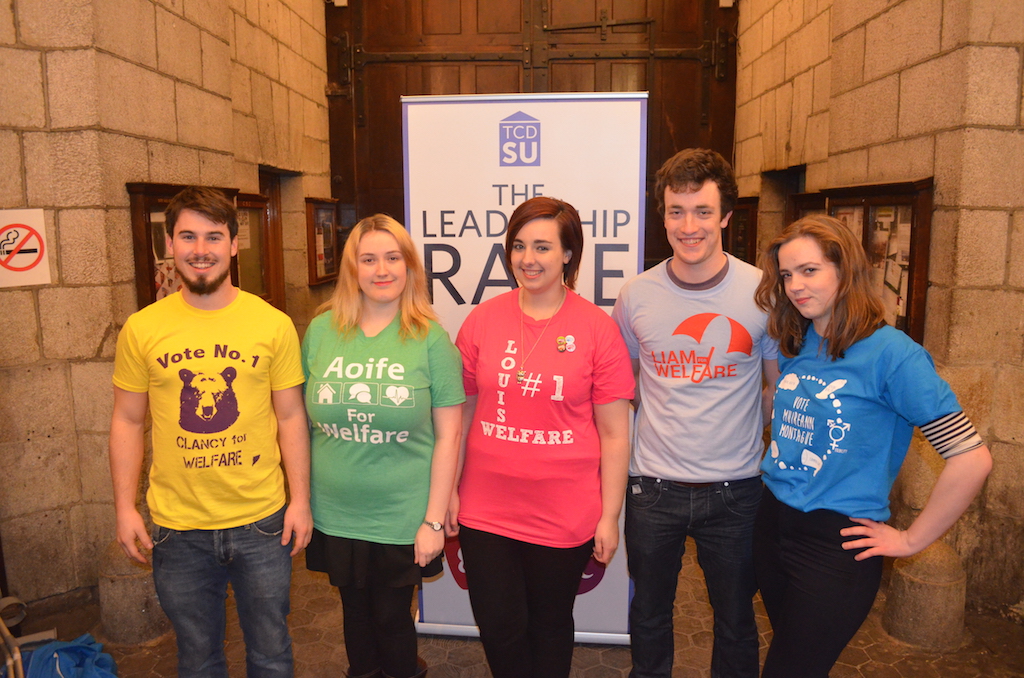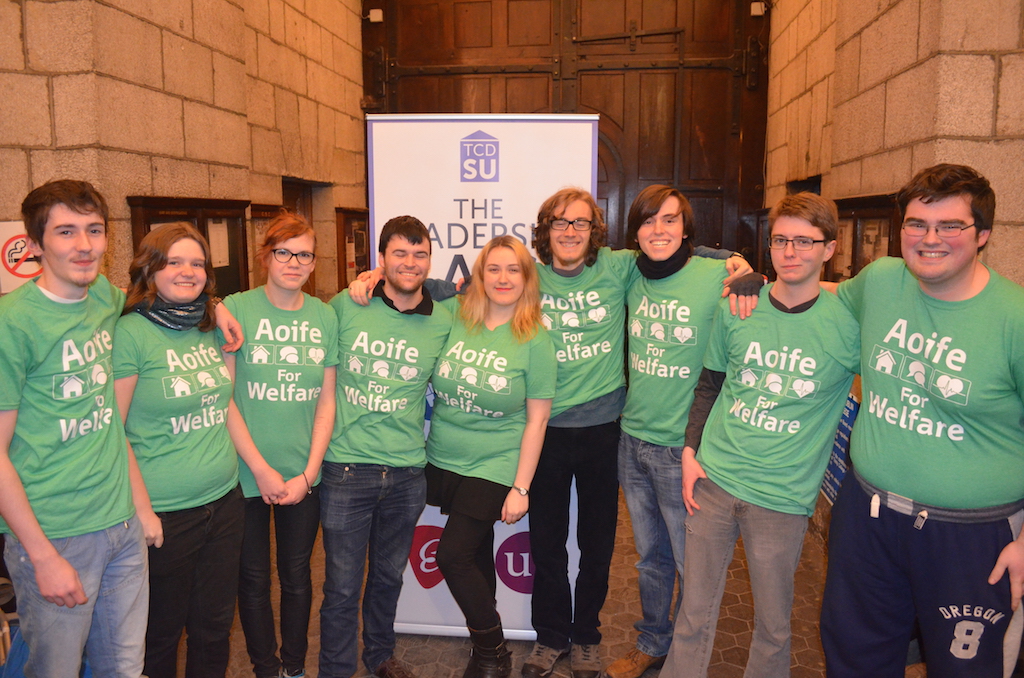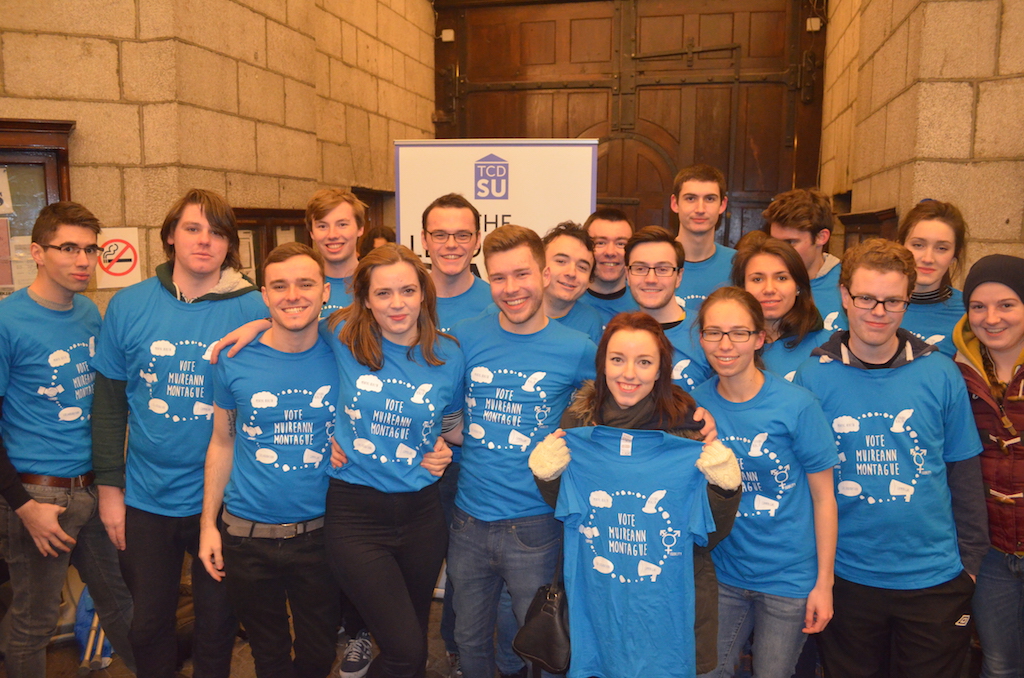Aine O’Connell | Staff Writer
Aoife O’Brien
Third-year Computer Engineering student Aoife O’Brien has focussed on the “unacceptable” elements of the Trinity Welfare platforms. The Wexford native is intensely strategic about the campaign, bringing a notebook of ideas along to the interview. O’Brien has worked with various societies in her three years in TCD, including founding the Germanic society. This year, she is the TCDSU Gender Equality officer, a new position that has influenced her manifesto, as has her three years on welfare teams and committees. She sums up her “overarching themes” as “accommodation, health and talking”. She also desires that TCD use its position as “one of Ireland’s leading colleges” to discuss LGBTQ issues, sexual health and the accommodation crisis in Dublin.
One of the aspects of the current welfare system that O’Brien finds unacceptable is the strain on student services such as the health and counselling centres. Her idea to remedy this is to implement partnerships with off-campus doctors and counsellors that have the TCDSU seal of approval. This can help alleviate the pressure on student services, O’Brien argues, by providing students with an alternative place to go. Aoife also hopes to introduce independent living classes to TCD, helping students to cook, clean and work on a budget and without stress.
O’Brien is a passionate advocate of the Queer community. She tells me of her plans to encourage a discussion of trans* issues in TCD, and to make “minority” identities more visible on campus. “I feel like the SU isn’t responding that much [to trans* issues]..and our trans* students deserve more” Aoife says, and aims to advocate and agitate for the whole Queer community. “It’s an ongoing fight”, she tells me, “and it’s not going to end in twenty years”. She also wants to highlight that there are more than just straight, gay and bisexual students on campus, to raise awareness of a gender spectrum rather than the typical sexualities.
She praises previous Welfare Officers for reserving places in accommodation specifically for TCD students, and is hoping to revisit this idea if elected. She also hopes to partner with hostels and B&B’s across the city centre to help international students, “so people have somewhere to stay while looking for permanent residence”.
O’Brien’s reputation precedes her: does she worry that people will dismiss her campaign as one of a “feminazi”? “Only if they don’t listen to anything I say or read anything I’ve written”, she says, sounding supremely unworried. “I’m expecting The Piranha to have a photo of me with a man’s head on a pike…frankly, I’ll be disappointed if they don’t”.
Conor Clancy
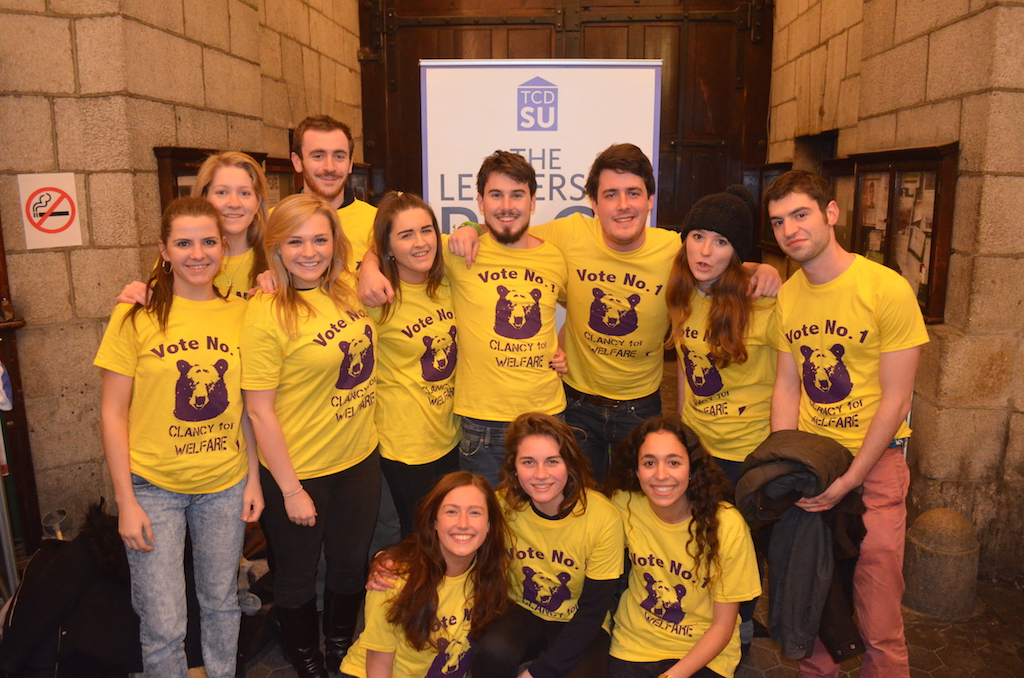
Conor Clancy is a final year history student at TCD who hails from Limerick city. Heavily involved with sport – he’s the Sports an Exercise Convenor with TCDSU and has an “all consuming passion” for rugby. Clancy has also worked with S2S peer mentoring and DU Players for a number of years. “Sports and activity have always been a huge part of my life. I recognize the huge potential activity it has as anything from a powerful antidote to depression to a social re-creative tool” . It comes as no surprise, then, to hear that Clancy is running his Welfare campaign with a view towards the power of physical activity.
His mental health policies continue to build on the platform of Sports and Exercise Convenor. “I’m in the middle of creating an SU information base for our .org website which ties in sports with mental health and breaks through some of the jargon”, he tells me. He believes that physical health can make a huge difference to mental health and wants to encourage students to connect the two.
Trinity has taken great leaps in terms of mental health, according to Clancy, but he still wants to try and reduce stigma across college. He hopes to continue this discussion in a positive way, gearing it towards mental wellness. His approach to the Welfare campaign is “student-centred” and he hopes to develop student services into something “innovative”, particularly the library. He believes that trinity should be a “better place to be in college” and hopes to organise relaxing events around exam time as well as more “student friendly spaces” like the proposed Sun Room and the SU Kitchen.
Conor sees health as one large issue – “mind, body and soul” and regarding sexual health, he sees it as a “vital part of being”. He wants to tackle the issue of campus assault and LGBTQ visibility head-on, to ensure a safer space for all at Trinity. Regarding all issues, Conor wants to ensure that student’s voices are heard on all issues that affect them, and to encourage a sense of community within college.
“Bottom line, the SU can be there to tackle student needs where they hit hardest” Clancy tells me. He looks forward to the race – “it means the best result for the student community [and that] whoever wins will do so because they are a great fit for the job. It also means that TCD can continue to push barriers to make this a great university”.
Louise O’Toole
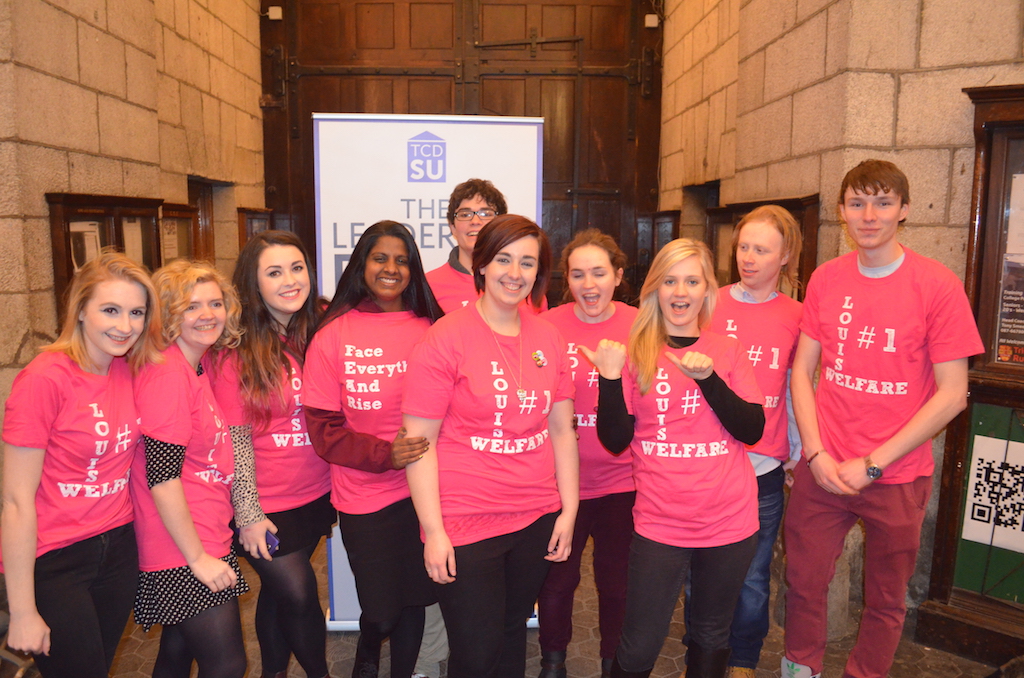
Louise O’Toole is this year’s Student 2 Student welfare candidate, having worked closely with the mentoring group since her second year at Trinity; this year she is the Public Relations Officer. The twenty-one year old Social Work student calls herself “ridiculously involved” at college while juggling mandatory course placements. She has been on placement four times, she tells me, and it had a big impact on her decision to run for Welfare Officer. “I saw how much one person can make a difference”, she said. Her work with S2S and as a “changemaker” made her want to run for welfare, as well as being “a naturally caring person”.
Louise is quick to praise previous welfare officers’ work, and hopes to “develop fully functioning services” from previous things implemented. She feels that it’s important to develop existing services and to “expand on what’s there already”. “Why let them fall by the wayside?” she asks. She praises Trinity’s Access Programme, which allowed her to study social work here, as well as the Welfare Ambassador programme, which sends students to “forgotten” parts of TCD’s campus.
Mental health dominates Louise’s manifesto. “I’m a big advocate for promoting positive mental health”, she says, and wants to encourage non-alcoholic events on campus. She rails against the habit many colleges have of talking about drink awareness “during Fresher’s Week…and then never again”. She has plenty of ideas around this, she tells me, but they’re not quite ready yet. She does mention wanting to encourage the gigs at College’s Chapel next year, calling them “amazing”. In terms of outside-college partnerships, O’Toole is interested in bringing in groups like SafeTalk and Assist to discuss suicide and mental with students. “So many people think it’s not okay to talk about suicide, but I want to change that”, she said, though she acknowledged the difficulties with bringing outside groups into TCD.
Equality is a big word for the Welfare campaigns this year — O’Toole takes a different track to the others. “I’m not just looking at the topical issues”, she says, before highlighting the need to recognise students in TCD with disabilities. She wants “equality for everyone” and to make Trinity more inclusive by working the part-time officers in TCDSU. Practicality is a huge aspect of O’Toole’s campaign too; she wants to include the Student Counselling Service in tours of the TCD campus which she believes will make a massive difference to its reputation as a “scary off campus building”.
I ask Louise if she’s worried about the pressure of the position. “Welfare will be a high-pressure job… but I worked in duty social work, I don’t think anything is more stressful than that!”
Muireann Montague
Twenty-three year old Chemistry student Muireann Montague responds to my question asking why she ran with the quip “in first year, I really hated college”. Having spent a year feeling lonely and unwanted in TCD, Montague feels that one of her strengths as Welfare Officer would be an ability to “notice the quiet person in the corner, the person having a hard day”. A heart-on-her-sleeve kind of campaigner, Muireann brought me up to speed on her time with QSoc (Trinity LGBT), the TCDSU welfare committee and work with the National Institute for Intellectual Disabilities. One of the most striking things about Muireann Montague is how genuine she is in her desire to give back to the student community; “to be someone to look up to, and to call on”.
Montague appears to have single-handedly brought an “ally culture” to College. “People [in QSoc] found out that I wasn’t LGBT and started using the world ally…and I had no idea what that was. I thought it would be a given”. As Liasons Officer, Montague ran the successful ally week in one of many attempts to encourage allies and LGBT students to become more integrated. She believes that LGBT allies are essential to ensuring equality in Ireland, and as welfare officer, she wants to “make that world a reality” for TCD. When I asked about other plans for her campaign, she grins at me. “We’ll start with sex!”. Muireann is, like all the candidates interviewed, passionately concerned with the statistics in the TCDSU sexual consent survey. From the little things (“We don’t hand out condoms with lube, and that needs to be an option”.) to the much more large-scale plans like developing a concrete support system for abuse and assault survivors in college, Montague is all over this topic. She also wants to encourage students to consider STI’s and consent. “I want that information out there…women take the pill, and worry about getting pregnant, but don’t think about the diseases”.
She also plans to help students with their mental health with workshops around coping mechanisms and ways to change thinking. She talks a lot about “embracing” emotions and feeling comfortable with feeling. It’s a novel approach to the mental health question, strengthened by her background in Cognital Behavioural Therapy and own struggle towards good mental health. Montague also has big plans for financial services to students and building a relationship with the NIID.
When asked to sum up her campaign, Muireann told me that she will “give her heart to this job” of thinking of the person in the corner.
Liam Mulligan
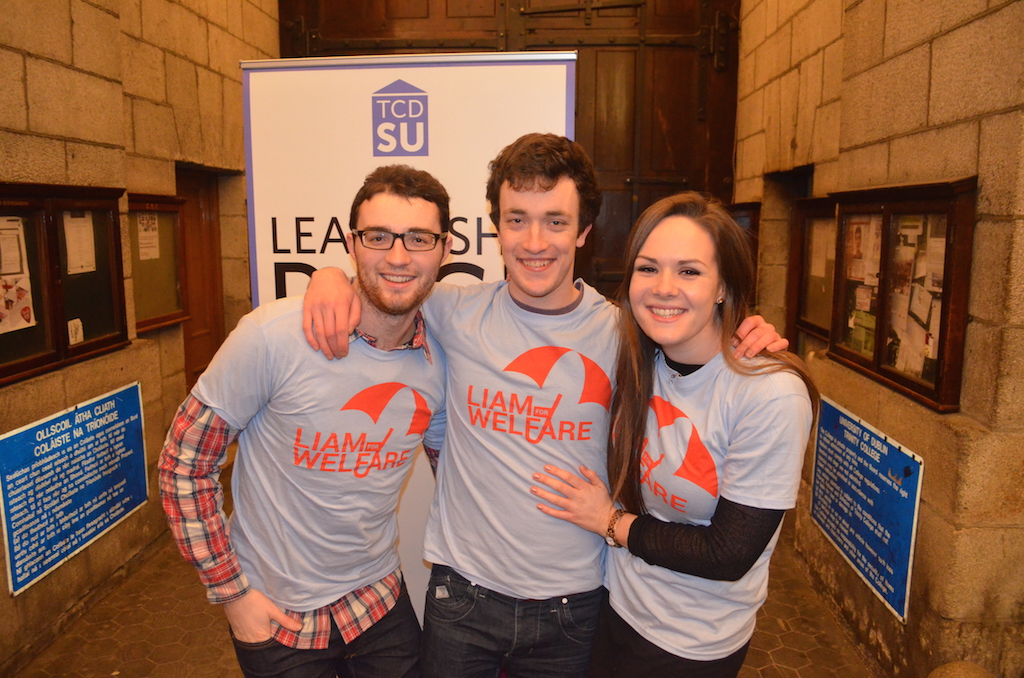
Liam Mulligan, Junior Sophister Business and Economics student comes across as extremely helpful. The Kilkenny native may look familiar as he featured in the “#TCDListens” video released by TCDSU last week. Mulligan is passionate about his running for Welfare Officer: “the job of the welfare officer should be to stand up for the students and fight for every aspect of their welface”, he tells me.
Liam is active both within College and outside, notably working as part of EvolveBiomed, a conference that looks to the future for improving healthcare. Within College, Mulligan is the Public Relations Officer of the Horse Racing Society. Mulligan has also engaged first hand with many of the services college provides. I have been able to view the flaws that currently exist within its operation and the great strengths which should be capitalised on and can’t be understated.” Mulligan tells me of his struggles with SUSI, the much-maligned student grant system, too: I have been appealing a decision taken by SUSI to refuse my request for a grant. I have had the chance to engage with TD’s and Trinity Senator David Norris who are currently helping me with my appeal” Mulligan says that “serious problems exist within this organisation which can negatively affect a very significant number of Trinity students’ lives every year” and he wants to try and change that. He highlights the issues with TCD’s budgeting, saying that “it a lot of power back to the students and we can finally start to make changes from this year on”.
When asked about his manifesto, Mulligan gives me all the details – he worries about an “increased resentment” for the SU in Science and Health Science departments of college, and wants to increased visibility of the Union in Speaking to most health science and other off campus students there is a huge amount of resentment and disenchantment with regards to the SU. Mulligan wants to change this and “create a positive experience” by spreading out to other TCD campuses. He also wishes to create “post placement events aimed at starting conversations on issues that are most affecting Trinity students”.
With regard to health, Mulligan wants to implement a “sports week” on Campus, in an effort to get Trinity active. This will allow wider access without being restricted by how much money [students] have for the week. This should also increase total memberships and revenue for sports clubs”. He also wishes to continue the conversation that #TCDTalks started with #TCDActs. “We should educate every student on the exact signs and types of mental health issues that exist so that we may take some of the onus of those suffering”, he tells me when I ask about mental health strategies for the campaign. “I want TCD not only to listen but to make sure we and [our] services act in the most constructive and positive way possible to help them through their issue.”
